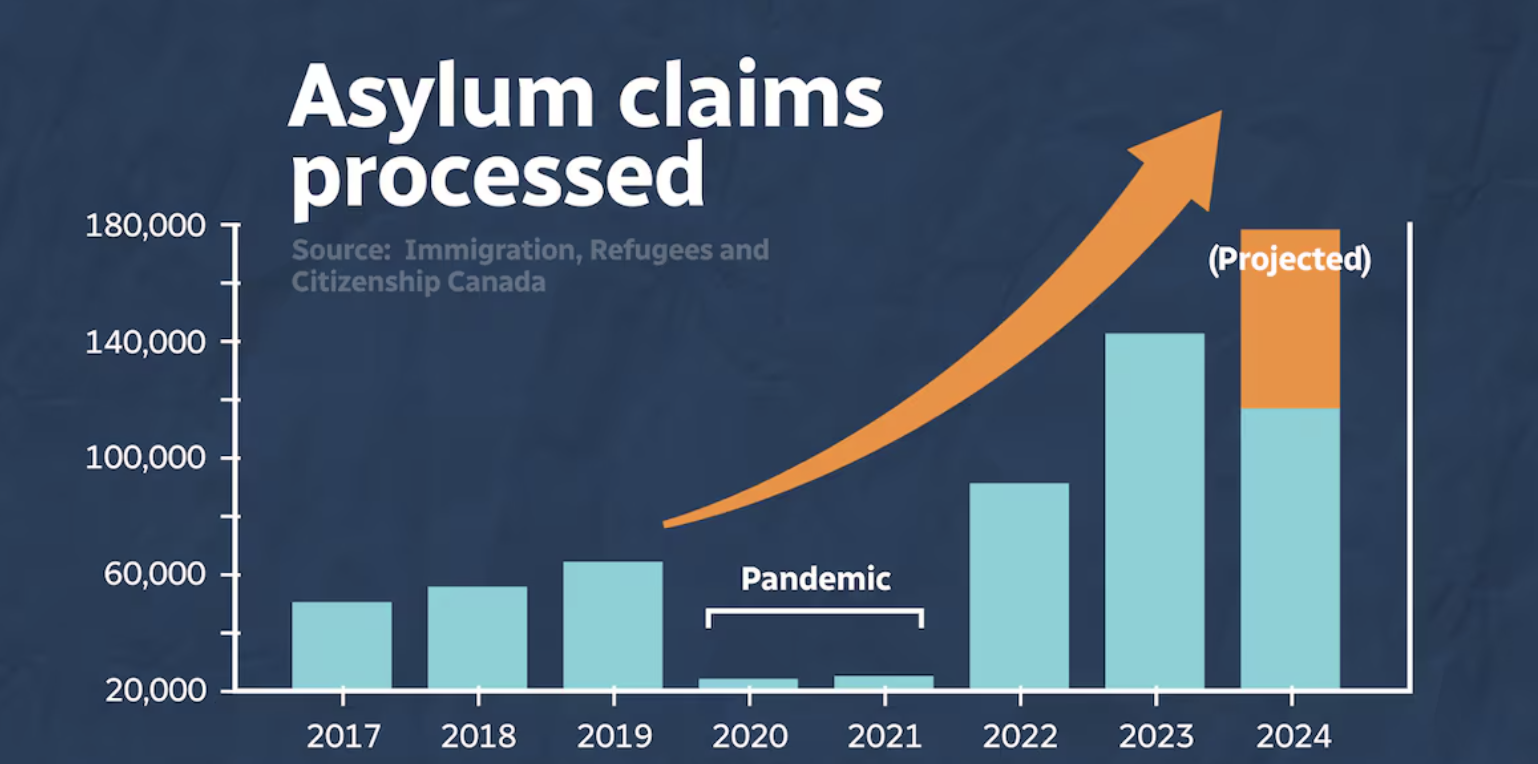UVic students caught in crossfire of changing national immigration policy

Graphic via CBC.
Applications for asylum by international students have skyrocketed in the last five years according to data sent from Immigration, Refugees and Citizenship Canada (IRCC) to Global News. The rise in asylum claims among international students has added to UVic’s financial struggles, as declining international enrollment has led to a $10 million shortfall in tuition revenue.
In 2023, 13 075 international students applied for asylum, a nearly 600 per cent increase since 2018, when only 2 230 international students applied for asylum. This year, almost 13 000 claims have been made by international students so far.
There have been multiple changes to temporary resident laws this year, including the temporary federal cap on international students, changes to eligibility for post-graduation work permits, changes to eligibility for spousal open work permits, and updated cost-of-living requirements, which rose from $10 000 to $20 635 CAD.
“The reality is that not everyone who wants to come to Canada will be able to — just like not everyone who wants to stay in Canada will be able to,” said Marc Miller, Minister of Immigration, Refugees and Citizenship in a Sept. 18 press release.
The shifting laws have sparked nationwide protests as over 70 000 international students face potential deportation due to federal policy changes. Experts, such as immigration lawyers, say that claiming asylum is the last resource students can utilize to stay in Canada.
After claiming asylum, people can wait in Canada until a decision is made. According to the Immigration and Refugee Board of Canada, projected wait times are approximately 24 months for refugee claims and 12 months for refugee appeals.
Prime Minister Justin Trudeau said to Global News that Canada has a moral obligation to offer asylum to those fleeing violence and persecution but also needs to ensure the system isn’t being misused.
“Our capacity to do that means we need to properly be able to identify who needs the most help, who is there as a true asylum seeker, and other people using the asylum path as a shortcut to gain Canadian permanent residency or citizenship is something that we need to continue to push back against,” he said.
For many international students, the promise of staying in Canada long-term is threatened by stricter work permit regulations. Asylum claims, once a rarity among international students, are now a potential lifeline for those who fear returning to their home countries.
An asylum claim is reserved for individuals who seek protection because they fear persecution in their home country due to race, religion, or political tension, among other reasons. If asylum is granted, the government provides refugee status to the claimant and they can stay legally and safely in the country. The growing number of asylum claims is troubling because it overwhelms the immigration system and puts at risk those who need urgent protection. It also strains public services and further complicates immigration policies.
At UVic, this trend coincides with the university’s financial struggles tied to declining international student enrollment. With international students paying nearly five times more in tuition than their peers who pay domestic tuition, the university’s budget has taken a significant hit.
UVic’s 2023 international undergraduate enrollment sits at 1 670 full-time equivalents (FTE), well below the target of 2 130 –– the lowest it has been in a decade.
“At UVic, we have noticed a rise in the complexity of the immigration-related cases students are facing. Many are navigating the recent immigration changes,” a UVic spokesperson wrote in an email to the Martlet. “It is too early to know how the policy changes announced this month might impact UVic’s student numbers.”
With international enrollment declining and asylum claims increasing, UVic and its students are caught in the middle of broader national immigration policy changes. The decline in international student enrollment has resulted in a $10 million reduction in tuition revenue, forcing UVic to rely on contingency funds to avoid further budget cuts.
“While policy changes can introduce uncertainties, UVic remains committed to offering a welcoming and supportive environment for all international students,” said the spokesperson. There are multiple resources that international students at UVic can access if they have concerns about their immigration situation, they added.
The International Centre for Students (ICS) counts on licensed immigration practitioners to monitor policy changes closely and provide support to students. In addition, UVic offers multilingual mental health support and socio-cultural programming through Support Connect, and it has partnerships with national organizations like the Canadian Bureau for International Education and Universities Canada to advocate and improve immigration processes for international students.
As the trend of rising asylum claims continues to intersect with the financial pressures of declining international student enrollment facing Canadian universities, the future remains uncertain for both international students and institutions like UVic. For students, it’s a matter of survival in an increasingly restrictive immigration environment. For UVic, the challenge is maintaining its role as a global institution amidst smaller budgets, changing demographics, and shifting political landscapes –– without compromising the experience of its international student demographic.







